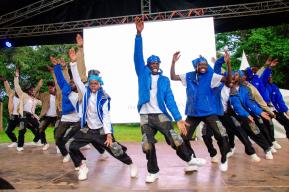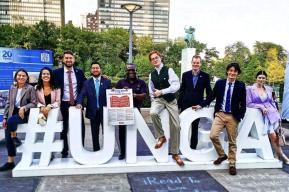Opening Session
In his introductory remarks, the Director of the UNESCO Regional Office in Abuja, Mr. YDO, YAO, clarified that these two webinars are part of UNESCO's response to continuity courses during and after COVID-19 in Africa. More fundamentally, the main objective of this webinar is to discuss the challenges of Higher Education in the context of Covid19, to discuss how the members of the Global Coalition for Education can help address challenges, and also share ideas on how to build more resilient Higher Education systems. Our webinar today therefore focuses on exploring solutions.
In her opening address, the Assistant Director-General of UNESCO for Education, Mrs. Stefania Giannini, indicated that the educational solution to this multidimensional crisis requires an approach concerted and multilateral. She recalled the major challenges that African Higher Education must face, in particular, COVID-19, but also, the other persistent pandemics: Ebola, malaria, tuberculosis, etc. Among the other challenges, which she mentioned, we can quote: food security, climate change, peace and security, but also knowledge infrastructures, in particular digital, Artificial Intelligence and Big Data. She will advise to take into account inclusion and equity in the implementation of all solutions related to this health crisis, so that no one is left behind. Ms. Stefania Giannini argued in favor of revitalizing scientific research by supporting laboratories and young research teams in Africa, because according to her, solutions to these crises will come mainly, from scientific research carried out by laboratories, young researchers, but also, through centers of excellence with high scientific added value. In Africa, the COVID-19 plans of our regional offices are aligned with the priorities defined by the member States, the regional and sub-regional economic communities, to offer solutions combining online training, radio and television broadcasts to ensure continuity courses during the COVID-19 health crisis, adds Ms. Stefania Giannini. She invites all the partners of the Global Coalition to bet on technological and ecologically sustainable solutions. The mobilization of the Global Coalition for Education is not a one-off action, but a structural approach with partners, anxious to lay the foundations for a real policy of digitization of official training programs, and rooting of the culture of long-term online training in Africa.
The Director of Human Resources of Science and Technology of the African Union, Mr. Mahama Ouedraogo, welcomed the initiative of UNESCO, which is in perfect coherence with the Agenda 2063 and CESA 2025 of the African Union and logically with the United Nations 2030 agenda. In terms of education, the Senior Official of the African Union, explained that Member States were not prepared for this health crisis. They were obliged to take the shift of online training, which appears in emergency situation. By using radio, television and online courses to keep pupils and students in learning situations, African States have taken good measures in managing the educational dimension of this health, said Mr. Mahama Ouedraogo. According to the African Union, the digital divide reveals the limits of Africa remote areas, to benefit from induced advantages of digital education. And it is precisely, at this level, that the UNESCO’s initiative, of Global Coalition for Education, bringing together, among other things, large technological companies ready to help African States to face the insufficient knowledge infrastructure should be supported according to Mr. Mahama Ouedraogo.
In his inaugural speech, he did not fail to recall to the three tools that were reactivated by AU to support Member States during this health crisis. First, Mr. Mahama Ouedraogo, reminded that the African Union Commission, has invited very early, African Members States, from the advent of COVID-19, to observe the barrier measures, and to close schools and universities to stop the spread of the pandemic. Then, the African Union has proactively reactivated its Center for Disease Prevention and Control (CDC). Finally, the Virtual Pan-African University E-University (PAVEU), the operational arm of the African Union to support the movement towards digitalization of Higher Education in Africa. This is the third tool, which has been set up by AU to support the digital education on the continent. In addition, Mr. Ouedraogo announced that the African Union and the AfDB are preparing to launch a fund to support innovation and scientific research.
The Representative of the Secretary General of the Association of African Universities (AAU), Professor Jonathan Mba, did not fail to praise the initiative of UNESCO regarding the launch of Global Coalition for Education. He presented the AAU COVID-19 plan. In this plan, Professor Etienne Ehilé, Secretary General of AAU invited UNESCO to work with his organization to realize the projects of the Global Coalition for Education in Africa. Three of the seven points of the AAU's COVID-19 plan have drawn particular attention: 1) creation of a partnership with the UbuntuNet Alliance (UA), the African Education and Research Network of West and Center Network (WACREN), Arab States Network for Research and Education (ASREN) and National Research and Education Networks (NREN), 2) launch of a partnership with eLearning Africa and WILEY Education Services to support African universities to accelerate their migration to online education; 3) the publication of a statement calling for massive investments to support the development of campus networks and research and teaching infrastructure.
The ECOWAS Commissioner, Professor Leopoldo Amado, recalled the huge delay of his sub-region in terms of knowledge infrastructures and online training and invited Member States to invest massively in network infrastructures. He will conclude his remarks by recalling that the ECOWAS COVID-19 plan for course continuity is co-constructed with the UNESCO Regional Office for West Africa, based in Abuja. This plan takes into account the digitalization of courses, but also the broadcasting of educational programs on radio and television.
The Regional Director of the International Telecommunication Union (ITU), Mr. Ali Idrissa Badiel, pointed out interventions carried out to reduce the digital divide in West Africa. He mentionned that UNESCO and the ITU have initiated an E-Education project in Senegal.
Speaking in turn, the Regional Office Director of the Agence universitaire de la Francophonie (AUF) for West Africa, Professor Jemaiel Ben Brahim, recalled that for at least three decades, the AUF has considerably invests in access to knowledge and online training through its global network of French-speaking digital campuses. Real places of knowledge production and support for online training, these infrastructures are gradually evolving towards the New French-speaking Digital Space.
The partners of the Global Coalition for Education in their diversity have proposed technological solutions to successfully implement online training. Coursera, Huawaei, Weidong, Netdragon, StarTimes, Hamdan Bin Mohamed Smart University (HBMSU), UNESCO IITE, ICHEI-UNESCO and CDNetworks, in turn, presented a diverse range of technological solutions ranging from intelligent classes, training offers to the design training platforms for universities and TVET institutions, Internet acceleration technologies and MOOCs. These service offerings are essentially free and aim to help universities and schools succeed in the forced shift to online training on the African continent.


Country and Regional Experiences of Virtual Universities
Country or regional experiences in successfully implementing of online learning at universities were shared. Four concrete examples of virtual universities were presented. Professor Belay Kassa, Rector of the Pan African University, which hosts the Pan African Virtual University E-University (PAVEU) of the African Union. For Rector Belay Kassa, PAVEU is one of the flagship projects of the African Union, which was proposed to meet the needs of Agenda 2063 aimed at accelerating the development of human capital, science, technology and innovation through increased access to tertiary education. PAVEU focuses mainly on online training, blended learning, free educational resources, to offer a real perspective to the development of virtual universities on the continent by supporting the creation or strengthening of those that exist.
The Virtual University of Tunis (Tunisia) is a great experience of virtual university on the continent. Created in 2002, the main mission of UVT is to develop university courses and online teaching programs for Tunisian universities. According to Professor Ezzeddine Zagrouba, Vice-President of this institution, UVT, has not really suffered from the perverse effects of COVID-19, like most Tunisian universities, which use the training platform in Moodle line. Finally, he ended his speech by recalling the major role played by the UVT, in the creation, in April 2018, of the African University Consortium for the Development of Virtual Education (CAUDEV), a real body for cooperation and sharing of good practices between African virtual universities.
Dr. Seydina Ndiaye, Director of Development and Cooperation at the Virtual University of Senegal (UVS), presented the COVID-19 plan to ensure continuity of the courses. The UVS did not suffer from this health crisis, on the contrary, it put its expertise at the service of other universities for the design of online training devices in Senegal. Created in 2013, the UVS is a response to the massification of Higher Education to the reduction of inequalities of access in Senegal. During the COVID-19 period, the UVS and the Radio Television of Senegal (RTS1), with the assistance of the Ministry of National Education launched, in April 2020, the creation of a television channel dedicated to education, "Learn to home ”to ensure continuity of lessons for students in areas where there is no Internet connection.
The Virtual University of Côte d'Ivoire (UVCI), created in 2015, is the second successful experience of virtual university in Africa south of the Sahara. It has served as a capacity-building center for Ivorian universities and educational establishments, which have taken the turn of online training, said Dr. Clément Lobo, Teacher at this university. Hackathons contests on the development of applications on the COVID-19 were launched set up for students in the search for technological solutions to this crisis.
The Advisor to the Minister of Higher Education of Djibouti, Dr. Fahmi Ahmed Mohamed, for his part, explained the strategic options put in place by his ministry to contain the negative effects of COVID-19 on the Higher Education of his country.
Conclusions and Recommendations
For the Directors of the UNESCO Multisectoral Regional Offices, in Nairobi and in Dakar, respectively, Mrs Ann Therese Ndong Jatta Ndong, Mr Dimitri Sanga, now that our partners of the World Coalition for Education, have presented their offers and others support to help universities, UNESCO will do its utmost to contextualize these service proposals with and with the support of our member states. The Director of the Multisectoral Regional Office for Central Africa, Mr. Salah Khaled, for his part, insisted on the digital inclusion and equity dimension, which wants the solutions of technological partners to be either free of charge or very affordable costs, to give every chance of success to these operations of online courses and distance education in Africa.
At the end of these two webinars of solutions, we will retain the following recommendations:
- The mobilization of the partners from the Global Coalition for Education with a view to the practical implementation of the solutions and offers proposed at the level of Member States.
- The digitization of the official curricula from primary to Higher Education for the establishment of a real culture of online training and distance education in Africa, simultaneously with the reinforcement of techno-pedagogical capacities of the teachers of the three sub- education sectors.
- The construction or the strengthening of knowledge infrastructures using renewable energies and more particularly solar energy to support the digitalization of Higher.
- The extension of PADTICE project by UEMOA, made necessary by the advent of COVID-19.
- The creation or the consolidation of centers of excellence with high scientific added value and the re-mobilization of research teams on priority themes with regard to the challenges which Africa must absolutely resolve: health, resilient agriculture and food security, climate change, peace and security, massive youth unemployment, or even Artificial Intelligence and Big Data.










